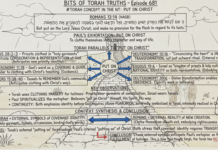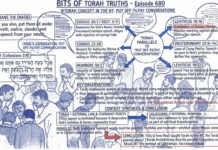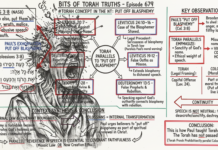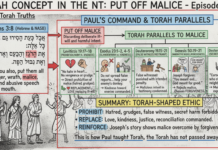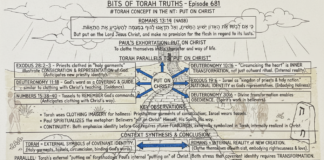Bits of Torah Truths – Torah Concept in the NT: Have No Respect of Persons – Episode 443
1 Timothy 5:21
הִנְנִי מֵעִיד בְּךָ לִפְנֵי אֱלֹהִים וְהַמָּשִׁיחַ יֵשׁוּעַ וְלִפְנֵי הַמַּלְאָכִים הַבְּחִירִים, שֶׁתַּקְפִּיד לְקַיֵּם אֶת הַדְּבָרִים הָאֵלֶּה בְּלִי לַחֲרֹץ מִשְׁפָּט מֵרֹאשׁ, וְאַל תַּעֲשֶׂה דָּבָר בְּמַשּׂוֹא פָּנִים.
James 2:1–10
2:1 אַחַי, אַל יְהֵא בָּכֶם מַשּׂוֹא פָּנִים בֶּאֱמוּנַת אֲדוֹנֵנוּ יֵשׁוּעַ הַמָּשִׁיחַ, אֲדוֹן הַכָּבוֹד.2:2 אִם יָבוֹא אִישׁ לְבֵית הַכְּנֶסֶת שֶׁלָּכֶם וְטַבַּעַת זָהָב עַל יָדוֹ וּלְבוּשׁוֹ הָדוּר, וּבָא גַּם אִישׁ עָנִי לָבוּשׁ בְּגָדִים בָּלִים,2:3 וְהִנֵּה פּוֹנִים אַתֶּם אֶל הָאִישׁ אֲשֶׁר לְבוּשׁוֹ הָדוּר וְאוֹמְרִים׃ ״שֵׁב לְךָ פֹּה בְּטוֹב״; וְלֶעָנִי אַתֶּם אוֹמְרִים׃ ״עֲמֹד שָׁם״ אוֹ ״שֵׁב מִתַּחַת לַהֲדֹם רַגְלַי״ ––2:4 הַאִם אֵינְכֶם מַפְלִים בְּקִרְבְּכֶם בֵּין אִישׁ לְאִישׁ וְהוֹפְכִים לִהְיוֹת שׁוֹפְטִים בַּעֲלֵי מַחְשְׁבוֹת רֶשַׁע?2:5 שִׁמְעוּ, אַחַי אֲהוּבַי, הֲלֹא בַּעֲנִיֵּי הָעוֹלָם הַזֶּה בָּחַר אֱלֹהִים לִהְיוֹת עֲשִׁירֵי אֱמוּנָה וְיוֹרְשֵׁי הַמַּלְכוּת אֲשֶׁר הִבְטִיחַ לְאוֹהֲבָיו.2:6 וְאַתֶּם בְּזִיתֶם אֶת הֶעָנִי. הֲלֹא הָעֲשִׁירִים מְדַכְּאִים אֶתְכֶם וְסוֹחֲבִים אֶתְכֶם לְבָתֵּי מִשְׁפָּט.2:7 הֲלֹא הֵם הַמְגַדְּפִים אֶת הַשֵּׁם הַטּוֹב הַנִּקְרָא עֲלֵיכֶם.2:8 אִם בֶּאֱמֶת מְקַיְּמִים אַתֶּם אֶת תּוֹרַת הַמַּלְכוּת, כַּכָּתוּב, ״וְאָהַבְתָּ לְרֵעֲךָ כָּמוֹךָ״, אֲזַי הֵיטַבְתֶּם לַעֲשׂוֹת.2:9 אֲבָל אִם אַתֶּם נוֹהֲגִים בְּמַשּׂוֹא פָּנִים, חוֹטְאִים אַתֶּם וְהַתּוֹרָה תַּאֲשִׁימְכֶם כְּעוֹבְרֵי עֲבֵרָה.2:10 הֲרֵי מִי שֶׁמְּקַיֵּם אֶת כָּל הַתּוֹרָה וְנִכְשָׁל בְּדָבָר אֶחָד, אָשֵׁם הוּא בַּכֹּל;
#torah #torahwisdom #torahtruth #torahforlife #torah4you #torahtruth
1 Timothy 5:21
5:21 I solemnly charge you in the presence of God and of Christ Jesus and of His chosen angels, to maintain these principles without bias, doing nothing in a spirit of partiality. (NASB)
James 2:1–10
2:1 My brethren, do not hold your faith in our glorious Lord Jesus Christ with an attitude of personal favoritism. 2:2 For if a man comes into your assembly with a gold ring and dressed in fine clothes, and there also comes in a poor man in dirty clothes, 2:3 and you pay special attention to the one who is wearing the fine clothes, and say, “You sit here in a good place,” and you say to the poor man, “You stand over there, or sit down by my footstool,” 2:4 have you not made distinctions among yourselves, and become judges with evil motives? 2:5 Listen, my beloved brethren: did not God choose the poor of this world to be rich in faith and heirs of the kingdom which He promised to those who love Him? 2:6 But you have dishonored the poor man. Is it not the rich who oppress you and personally drag you into court? 2:7 Do they not blaspheme the fair name by which you have been called? 2:8 If, however, you are fulfilling the royal law according to the Scripture, “YOU SHALL LOVE YOUR NEIGHBOR AS YOURSELF,” you are doing well. 2:9 But if you show partiality, you are committing sin and are convicted by the law as transgressors. 2:10 For whoever keeps the whole law and yet stumbles in one point, he has become guilty of all. (NASB)
https://www.matsati.com/index.php/category/bits-of-torah-truths/
The Torah also contains teachings that emphasize the importance of impartiality and fairness, which are similar to the concept in 1 Timothy 5:21 and James 2:1-10 about showing no favoritism. For example, in Deuteronomy 1:17 we read, “Do not show partiality in judging; hear both small and great alike. Do not be afraid of anyone, for judgment belongs to God.” This verse explicitly states the importance of judging fairly and impartially. Leviticus 19:15 says, “Do not pervert justice; do not show partiality to the poor or favoritism to the great but judge your neighbor fairly.” This verse instructs the Israelites to administer justice without favoritism, ensuring fairness for all. Deuteronomy 16:19 also says, “Do not pervert justice or show partiality. Do not accept a bribe, for a bribe blinds the eyes of the wise and twists the words of the innocent.” This verse further reinforces the principle of impartiality and the need for integrity in judgment. These passages from the Torah emphasize the importance of treating everyone fairly and without bias, reflecting the same principles found in the NT teachings about impartiality. This is how Paul and James taught Torah, the Torah has not passed away!

